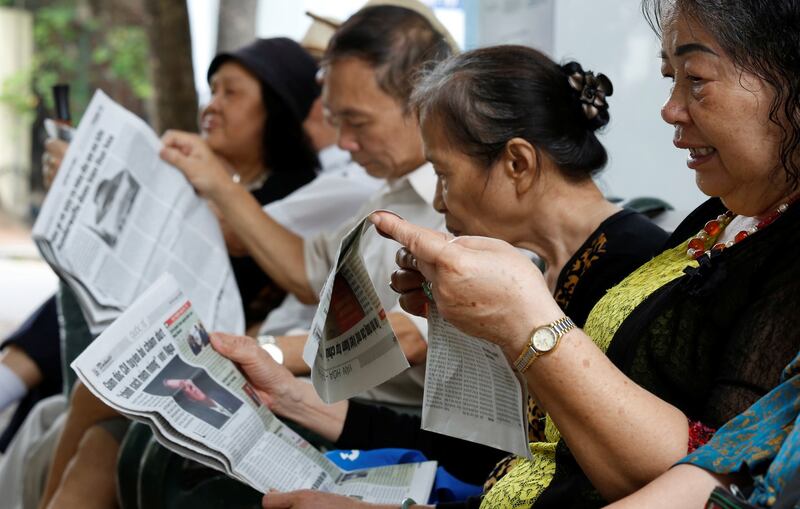As Russia launches a major military invasion on Ukraine, Moscow’s closest partner in Southeast Asia - Hanoi - has remained passive, giving no substantive comment besides a formulaic call for restraint.
Vietnamese media, on the other hand, are covering the conflict in great detail, surprisingly without much of their usual pro-Russia bias.
When the so-called Euromaidan protest movement rocked Ukraine in 2014, followed by the Russia-Ukraine conflict that led to the annexation of Crimea by Russia, Vietnamese state-run media generally blamed the crisis on “the West.” Fault was seen to lie with the U.S. and on NATO expansion aimed at bringing Ukraine out of Russia’s sphere of influence.
Today, the picture is different.
Nhan Dan daily, the mouthpiece of Vietnam's ruling Communist Party, reported both sides' arguments at Tuesday's United Nations Security Council's emergency meeting on Ukraine. It carried quotes by not only the Russian and Chinese representatives but also by the U.S. ambassador to the U.N. and a statement from the Ukrainian President Volodymyr Zelenskyy.
The official Vietnam News Agency’s online newspaper, Bao Tin Tuc, while dedicating more space as usual to the Russian accounts of the crisis, also reported on the West’s condemnation of Russian President Vladimir Putin’s recognition of the two breakaway regions in eastern Ukraine, as well as the European sanctions against Moscow.
An opinion piece went as far as saying that Putin's action has "destroyed the hope for a diplomatic solution to the conflict."
The Vietnamese Ambassador to Ukraine, Nguyen Hong Thach, went on national TV to say he was “extremely surprised” and did not expect that Putin would unleash Russian forces that quickly and resolutely.
The Russia-Vietnam relationship goes back a long way to the Soviet era. The Soviet Union was among the first countries to diplomatically recognize the Democratic Republic of Vietnam, now the Socialist Republic of Vietnam, in 1950.
Russia is Vietnam’s first strategic partner and one of its only three so-called “comprehensive strategic partners,” besides China and India. Moscow was also Hanoi’s biggest donor, up until the collapse of the Soviet Union and the Eastern Bloc.
To this day, Russia remains Vietnam’s most important defense partner and the main provider of weapons and military equipment to the Vietnamese armed forces.
For those reasons, any criticism of Russia and Putin’s foreign policy, especially when it doesn’t relate to Vietnam directly, is highly unusual.
Vietnam doesn’t have private media and most of the local media strictly follow the lines given to them by a special arm of the Communist Party called the Central Commission for Propaganda and Education.
Nevertheless, as more than 70 percent of Vietnam's population has access to the internet and the younger generation of journalists are now able to utilize English-language news sources, more 'westernized ideas' have penetrated into the domestic media, to the dismay of conservatives.

Warnings about China
The Vietnamese government so far has not said anything about the Russian attacks but on Wednesday released its first statement on the Ukrainian conflict with a well-rehearsed call on all sides "to exercise restraint and resolve differences peacefully through diplomatic means based on the Charter of the United Nations and the main principles of international law."
However, discussions of the Ukrainian situation are hotting up on Vietnamese social media platforms, particularly Facebook where there are 66 million Vietnamese users.
Vietnamese netizens’ interest in the ongoing conflict some 8,000 kilometers (5,000 miles) away focuses on some main topics: the small community of 6,000-7,000 Vietnamese living in Ukraine, the impact on the world’s economy, and China.
While there fraternal ties between the communist parties of China and Vietnam, there’s also suspicion and rivalry between the two nations, including over their conflicting claims in the South China Sea.
“China has partnered up with Russia to form a new world order,” said former ambassador Nguyen Ngoc Truong, a political analyst.
“Now, Asia should beware of China,” he added.
“The U.S. has made a strategic mistake,” said another Vietnamese analyst who wishes to stay anonymous as he’s affiliated to the government and not authorized to speak to the media.
“They [the U.S.] seem to forget that their real competitor is China. To go to war with Russia is having to fight on two fronts at the same time. Defeat is almost guaranteed,” the analyst said.
The Biden administration says it won't send troops to fight in Ukraine. And China also maintains it won't exploit the situation there, saying it has no self-interest in the Ukraine issue.But many Vietnamese voice concern that with Washington distracted by the escalating tension in Ukraine, Beijing would take advantage and push its agenda in the Asia-Pacific.
Taiwan and the South China Sea seem the most obvious targets as China has already been claiming ownership there, the Vietnamese analyst said, adding that how it plays out depends on the developments in Europe.
